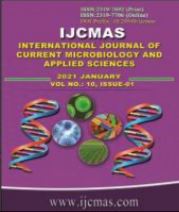


 National Academy of Agricultural Sciences (NAAS)
National Academy of Agricultural Sciences (NAAS)

|
PRINT ISSN : 2319-7692
Online ISSN : 2319-7706 Issues : 12 per year Publisher : Excellent Publishers Email : editorijcmas@gmail.com / submit@ijcmas.com Editor-in-chief: Dr.M.Prakash Index Copernicus ICV 2018: 95.39 NAAS RATING 2020: 5.38 |
Pre and post-emergence damping-off disease caused by Pythium spp which is a facultative parasite and lives saprophytically on the moist humus in soil and attacks seedlings at the soil level. “Damping off”, “Soft rot”, “Wheat rot”, or the “foot rot” of the seedlings is commo diseases caused by the fungus. P. aphanidermatum and also causes “damping off” disease of tobacco, mustard, chillies and cress seedlings. Rapid germination of sporangia of Pythium after exposure to exudates or volatiles from seeds or roots followed by immediate infection make management of Pythium very difficult. It is estimated that diseases caused by Pythium species in different crops are responsible for losses worldwide. Besides this, P. aphanidermatum became resistant to the common fungicides used against it. So, using a biocontrol agent against the phytopathogens was always significant because Pseudomonads possess many traits that make them well suited as bio control and growth-promoting agents. In addition, pseudomonads are responsible for the natural suppressiveness of some soils to soil borne pathogens and can provide biological control of soil borne pathogens on a wide range of crops, and they have a key role in the suppressiveness of some soils to plant pathogens. Pseudomonas isolates were isolated from the rhizosphere of vegetable and ornamental crops to use as biocontrol agents. A total of six isolates were isolated and identified through bio-chemical tests and characterization of Pseudomonas. Then the isolates were screened for antagonism in vitro against Pythium aphanidermatum in laboratory conditions through dual culture assay. Among six isolates, all were inhibiting the Pythium aphanidermatum at various levels. Overall, the isolate 2 was inhibiting maximum percent over reduction at 48 hrs with 58.25% and isolates 6 was inhibiting the minimum percent over reduction at with 54.69%. Whereas, in field trails, after 55DAT the isolate 1 was most effective and excelled among all the isolates with 34.46% by following all the isolates participated certainly in increasing the growth parameters of chilli.
 |
 |
 |
 |
 |